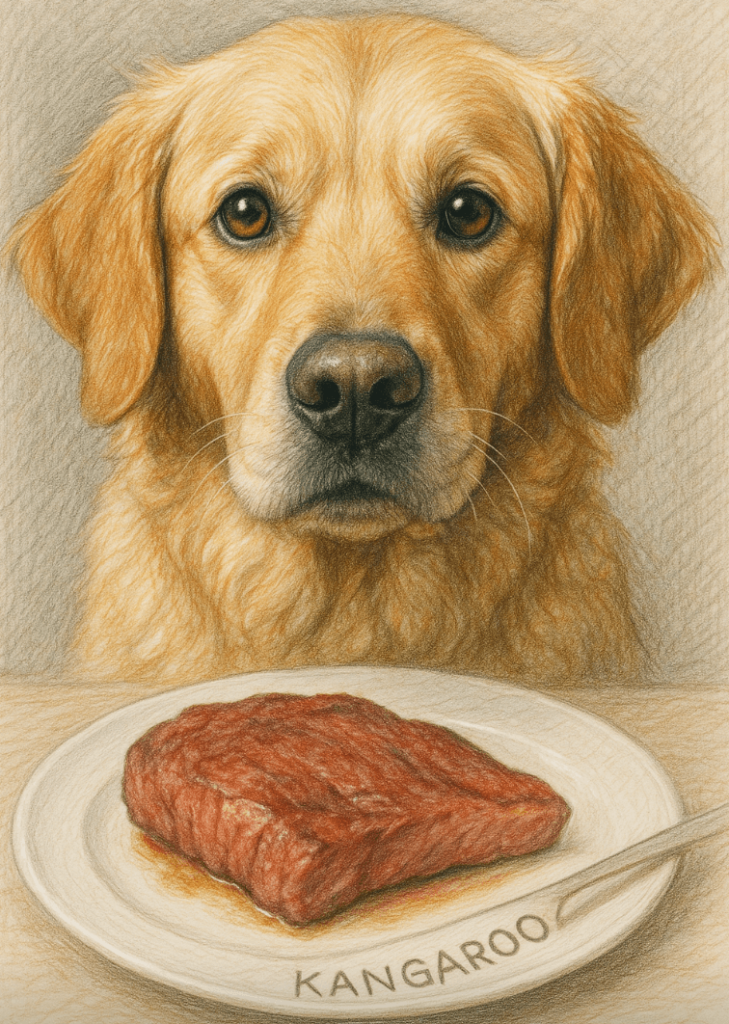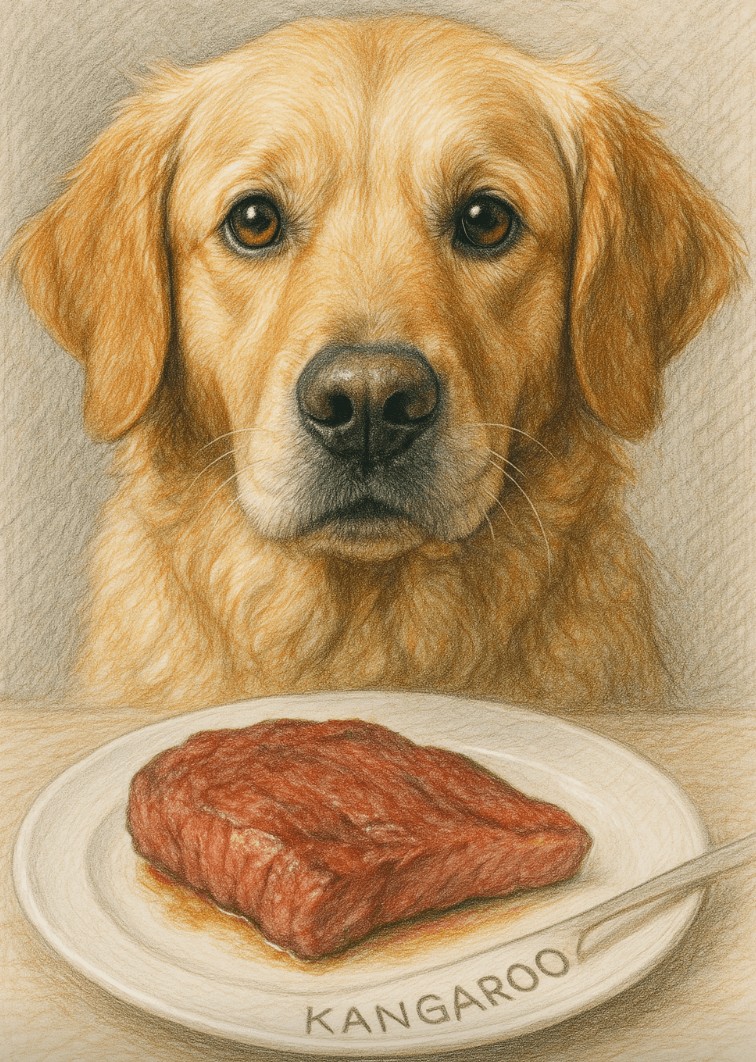Can Dogs Eat Kangaroo Meat?
When it comes to feeding our furry friends, many pet owners are exploring alternative protein sources to keep their dogs healthy and satisfied. Kangaroo meat has gained attention as a lean, nutrient-rich option that could benefit dogs. But is kangaroo meat safe for dogs, and what are the potential benefits or risks? In this blog post, we’ll delve into everything you need to know about feeding kangaroo meat to your dog. From its nutritional profile to preparation tips and safety precautions, we’ll help you make an informed decision about incorporating this unique protein into your dog’s diet.
Benefits of Feeding Kangaroo Meat to Dogs
Kangaroo meat offers several advantages that make it an appealing choice for dog owners looking to diversify their pet’s diet. Here are some key benefits of including kangaroo meat in your dog’s meals.
High in Protein:
Kangaroo meat is exceptionally high in protein, which supports muscle growth, repair, and overall energy levels.Low in Fat:
With significantly less fat than traditional meats like beef or lamb, kangaroo meat is ideal for dogs needing weight management or those prone to obesity.Rich in Omega-3 Fatty Acids:
These essential fatty acids promote skin and coat health while supporting joint function and reducing inflammation.Packed with Essential Nutrients:
Kangaroo meat contains vitamins like B12 and minerals such as iron and zinc, which contribute to immune health and vitality.Hypoallergenic Properties:
As a novel protein source, kangaroo meat is less likely to trigger allergies in dogs with sensitivities to common proteins like chicken or beef.
These benefits highlight why kangaroo meat can be a nutritious addition to your dog’s diet when introduced properly.
Potential Risks of Feeding Kangaroo Meat to Dogs
While kangaroo meat is generally safe for dogs, there are some considerations to keep in mind to ensure their safety and well-being.
Risk of Choking or Digestive Blockages:
Feeding large chunks or bones from kangaroo meat can pose choking hazards or cause obstructions in the digestive tract.High Iron Content:
While beneficial in moderation, excessive iron intake can lead to gastrointestinal upset or imbalances in sensitive dogs.Improper Preparation:
Seasonings, spices, or additives commonly used in human recipes can harm dogs if included in their food.Parasites or Contaminants:
If not sourced from reputable suppliers, raw kangaroo meat may carry parasites or bacteria that could sicken your dog.Allergic Reactions (Rare):
Although hypoallergenic, some dogs may still develop allergic reactions to kangaroo meat, especially if introduced suddenly.
Understanding these risks allows you to take precautions and feed kangaroo meat safely to your dog.
Check this guide 👉Can Dogs Eat Without Teeth? Best 7 Expert Tips!
Check this guide 👉Can Dogs Eat Magnesium? Best 7 Expert Tips!
Check this guide 👉Can Dogs Eat Naan Bread? Best 7 Expert Tips!

Benefits of Kangaroo Meat for Dogs | Risks of Kangaroo Meat for Dogs |
|---|---|
High in lean protein | Risk of choking on bones or large pieces |
Low in fat, great for weight management | Potential for excessive iron intake |
Rich in omega-3 fatty acids | Harmful if seasoned or spiced |
Hypoallergenic for sensitive dogs | Risk of parasites in raw meat |
Packed with essential vitamins and minerals | Rare allergic reactions possible |
How to Safely Introduce Kangaroo Meat to Your Dog’s Diet
If you decide to feed kangaroo meat to your dog, proper preparation and gradual introduction are key to ensuring a smooth transition. Follow these steps for a safe experience.
Choose High-Quality Sources:
Opt for kangaroo meat specifically labeled for pet consumption or sourced from trusted suppliers to avoid contaminants.Introduce Gradually:
Start by mixing small amounts of kangaroo meat with your dog’s regular food to allow their digestive system to adjust.Cook Thoroughly (Optional):
While some dogs thrive on raw diets, cooking kangaroo meat eliminates potential bacteria and makes it easier to digest for sensitive dogs.Avoid Seasonings and Additives:
Never add salt, garlic, onions, or other seasonings that could harm your dog’s health.Monitor for Reactions:
Watch for signs of digestive upset, allergic reactions, or changes in behavior after introducing kangaroo meat.
By following these guidelines, you can safely incorporate kangaroo meat into your dog’s diet without compromising their health.
Signs Your Dog May Be Struggling with Kangaroo Meat
Even with careful preparation, some dogs may experience issues after consuming kangaroo meat. Recognizing these warning signs ensures prompt action to protect your pet’s well-being.
Vomiting or Diarrhea:
These symptoms may indicate digestive distress or intolerance to the new protein source.Lethargy or Loss of Appetite:
A sudden lack of energy or refusal to eat could signal discomfort or illness.Skin Irritations or Itching:
Allergic reactions often manifest as redness, itching, or rashes on the skin.Excessive Gas or Bloating:
Digestive issues like gas or bloating suggest your dog’s system isn’t tolerating kangaroo meat well.Difficulty Breathing:
In rare cases, severe allergic reactions can cause respiratory distress; seek veterinary care immediately if this occurs.
Being vigilant about these signs helps you address any problems quickly and adjust your dog’s diet accordingly.
Common Myths About Feeding Kangaroo Meat to Dogs
Misconceptions about kangaroo meat abound, leading to confusion among pet owners. Let’s debunk some common myths to set the record straight.
Myth: Kangaroo Meat Is Too Exotic for Dogs:
While unusual, kangaroo meat is just as digestible as other proteins when introduced properly.Myth: It’s Always Better Raw:
Raw feeding works for some dogs, but cooked kangaroo meat is equally nutritious and safer for certain pets.Myth: Kangaroo Meat Causes Aggression:
There’s no scientific evidence linking kangaroo meat to behavioral changes in dogs.Myth: It’s Hard to Find Kangaroo Meat:
With growing demand, kangaroo meat is increasingly available through specialty pet stores and online retailers.Myth: All Dogs Love Kangaroo Meat:
While most dogs enjoy it, individual preferences vary, and some may be indifferent or hesitant to try it.
Dispelling these myths helps you make informed decisions about feeding kangaroo meat to your dog.
Alternatives to Kangaroo Meat for Dogs
If kangaroo meat isn’t suitable or accessible for your dog, there are plenty of alternative protein sources that offer similar benefits.
Venison:
Another novel protein, venison is lean and rich in nutrients, making it a great option for dogs with allergies.Turkey:
Low in fat and easy to digest, turkey is an excellent choice for dogs needing a lighter protein source.Fish (Salmon or Sardines):
Rich in omega-3 fatty acids, fish supports skin, coat, and joint health while providing variety.Duck:
Duck meat is flavorful and packed with iron, making it a nutritious alternative for picky eaters.Lamb:
Though higher in fat, lamb is a tasty and nutrient-dense option for dogs without dietary restrictions.
These alternatives ensure your dog enjoys a diverse and balanced diet even if kangaroo meat isn’t an option.
Fun Ways to Incorporate Kangaroo Meat into Your Dog’s Diet
Adding kangaroo meat to your dog’s meals doesn’t have to be boring. Here are some creative ideas to make it more enjoyable for your pup.
Kangaroo Meatballs:
Mix ground kangaroo meat with oats or rice, shape into balls, and bake for a healthy treat.Toppers for Kibble:
Use small pieces of kangaroo meat as a flavorful topping to enhance your dog’s regular dry food.Homemade Kangaroo Stew:
Combine kangaroo meat with vegetables like carrots and sweet potatoes for a hearty, homemade meal.Freeze-Dried Treats:
Dehydrate thin slices of kangaroo meat to create long-lasting, chewy snacks.Training Rewards:
Cut kangaroo meat into bite-sized pieces for use during training sessions as a high-value reward.
These ideas make feeding kangaroo meat both practical and fun for your dog.
Frequently Asked Questions About Feeding Kangaroo Meat to Dogs
Is kangaroo meat safe for all dogs?
While most dogs tolerate kangaroo meat well, those with specific health conditions should consult a vet before trying it.
Can I feed my dog raw kangaroo meat?
Yes, but only if it’s sourced from reputable suppliers and your dog is accustomed to a raw diet.
How often can I feed my dog kangaroo meat?
Kangaroo meat can be fed occasionally as part of a balanced diet, but it shouldn’t replace all other protein sources.
What should I do if my dog has an allergic reaction?
Stop feeding kangaroo meat immediately and contact your veterinarian for guidance.
Where can I buy kangaroo meat for my dog?
Look for pet-safe kangaroo meat at specialty pet stores, online retailers, or trusted butcher shops.
Feeding Kangaroo Meat: A Healthy Choice for Your Dog?
Kangaroo meat offers numerous benefits as a lean, nutrient-dense protein source for dogs, making it a worthwhile addition to their diet when prepared and introduced correctly. However, it’s essential to weigh the advantages against potential risks and tailor your approach to your dog’s individual needs. By sourcing high-quality meat, monitoring your dog’s response, and consulting your veterinarian, you can ensure a safe and enjoyable experience for your furry friend. Whether used as a treat, supplement, or occasional meal replacement, kangaroo meat can provide variety and nutrition to support your dog’s overall health and happiness.
Do Cats Have Taste Buds? Best 7 Expert Tips! – Discover how cats experience flavors and why their taste is so unique.
Do Dogs Have Taste Buds? Best 7 Expert Tips! – Discover how dogs experience taste, their preferences, and what it means for their diet and health.
Can Cats Taste Sweet? Best 7 Expert Tips! – Discover why cats can’t taste sweetness, how it affects their diet, and tips to keep them healthy and happy.
Can Dogs Taste Sweet? Best 7 Expert Tips! – Discover how dogs perceive sweetness, which foods are safe, and tips to manage their sweet cravings responsibly.





